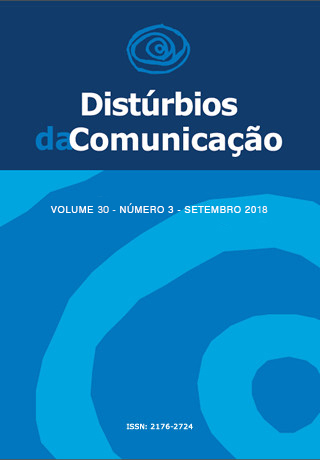Voice handicap in lyric singers
DOI:
https://doi.org/10.23925/2176-2724.2018v30i3p-500-509Keywords:
Music, Singing, Voice, Voice Disorders, Speech, Language and Hearing Sciences.Abstract
Introduction: The Classical Singing Handicap Index (CSHI) assists the singer in the perception of his voice and the impact of the vocal production in his professional life. Objective: To compare the self-perception of the vocal handicap in lyric singers and the sociodemographic variables, the vocal complaints, the use of spoken voice and the period of the vocal signals and symptoms. Methods: Crosssectional and analytical research, with thirty lyric singers from a public singing school. A questionnaire with sociodemographic data about the voice and the CSHI was used. The independent variables were dichotomized and compared to the domains: disability, handicap and defect of the CSHI through the Mann-Whitney test adopting a level of statistical significance of 5% (p≤0.05). Results: The habit of clearing the throat was the most frequent symptom. The CSHI scores indicated higher averages in the Defect domain. There was a statistically significant difference in all the subscales and in the total among those with and without vocal fatigue (Inability p = 0.003, Handicap p = 0.028, Defect p = 0.013, Total p = 0.007); as well as the period of the vocal signs and symptoms between no problem/acute problem and chronic problem (Handicap p = 0.011, Defect p = 0.008, Total p = 0.012); and among those with and without vocal complaints (P = 0.022, being adjacent in the Total p = 0.053). Conclusion: The lyric singers presented vocal handicap among those who reported fatigue when speaking and/or singing, with vocal complaints and these ones in a period considered chronic.Downloads
Downloads
Published
Issue
Section
License
Copyright (c) 2018 Luiza Augusta Rosa Rossi-Barbosa, Joyce Elen Murça de Souza, Mirna Rossi Barbosa-Medeiros

This work is licensed under a Creative Commons Attribution 4.0 International License.









